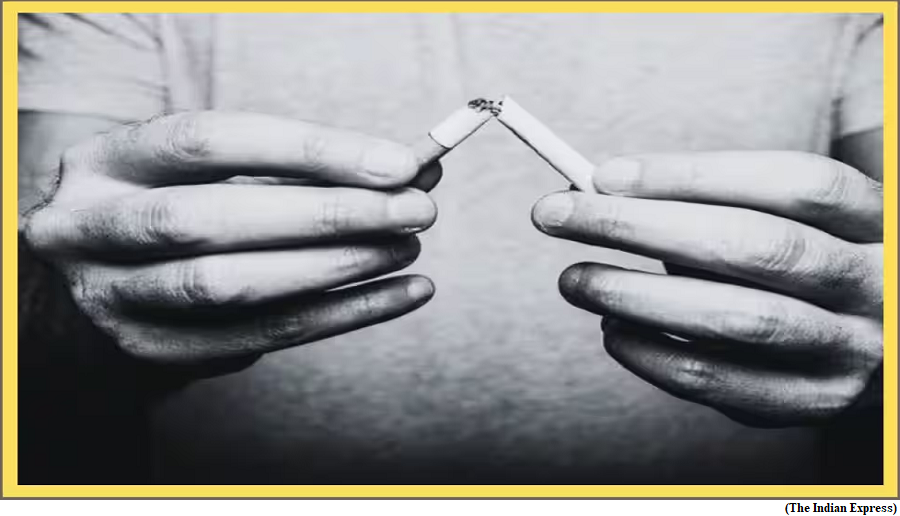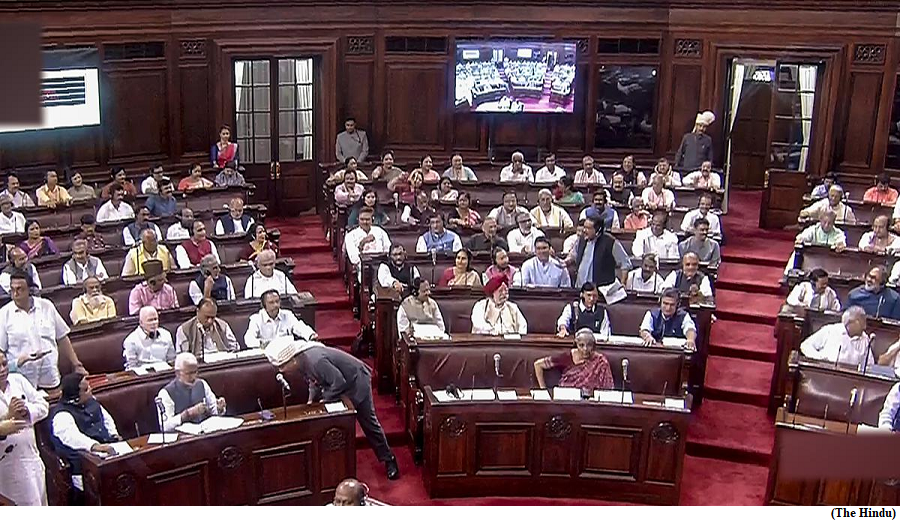WHO report on tobacco control, Key findings, how India fares (GS paper 2, International Organisation)

Why in news?
- Recently, a report was released by the World Health Organisation (WHO) related to implementation of MPOWER measures.
- Fifteen years ago, WHO had developed the MPOWER measures, monitor tobacco use and prevention policies; protect people from tobacco smoke; offer help to quit tobacco; warn about dangers of tobacco; enforce bans on tobacco advertising; and raise taxes on tobacco products.
- Across the world, there are 300 million fewer smokers today,with the prevalence of smoking declining from 22.8% in 2007 to 17% in 2021.
What does the report say?
- Since the MPOWER measures were first introduced, 5.6 billion people in the world– or 71% of the entire population, remain protected by at least one of the measures. This has increased from just 5% of the population in 2008.
- The number of countries implementing at least one MPOWER measure has increased from 44 countries in 2008 to 151 in 2022. At least four countries; Brazil, Turkiye, Netherlands, and Mauritius have implemented all the measures.
- There are at least 44 countries in the world that still do not implement any MPOWER measure. There are 53 countries that do not completely ban smoking in healthcare facilities. And only half of the countries have smoke-free workplaces and restaurants.
Why is it important to curb second-hand smoke?
- Almost 40% countries now have completely smoke-free indoor public spaces.
- The report focuses on controlling second-hand smoking (being in the presence of someone who is smoking) by creating smoke-free public areas and also de-normalising the act of smoking in the society.
- Of the estimated 8.7 million tobacco-related deaths each year, 1.3 million are of non-smokers exposed to second-hand smoke, the report says quoting the Global Burden of Disease 2019.
- The severe asthma, respiratory tract infections, and sudden infant death syndrome are more common among children exposed to second-hand smoke.
How does India fare?
- India has the highest level of achievement when it comes to putting health warning labels on tobacco products and providing tobacco dependence treatment.
- With 85% of cigarette packs carrying health warnings both on the front and back, India figures among the top 10 countries in terms of the size of health warnings. The cigarette packets in the country also carry a toll-free number for a quit-line.
- India has also banned the sale of e-cigarettes, and banned smoking in healthcare facilities and educational institutions. The report ranks the implementation of these bans and 8 out of 10 in healthcare facilities, 6 in schools, and 5 in universities.
What do experts say?
- One of the biggest steps in the works is implementing warnings on OTT platform content when actors are seen using tobacco products.
- India already has a comprehensive law on tobacco control, but some amendments are needed in the 20-year-old legislation.
Rajya Sabha passes Multi-State Cooperative Societies (Amendment) Bill
(GS paper 3, Economy)
Why in news?
- The Rajya Sabha recently passed to the Multi-State Cooperative Societies (Amendment) Bill 2023.

Details:
- This Bill introduces significant amendments to the Multi-State Cooperative Societies (MSCS) Act.
- These modifications aim to enhance the transparency and accountability of these cooperatives’ operations in a bid to improve governance.
- The MSCS Act has not seen changes since 2002, making these updates noteworthy. The Lok Sabha had previously approved the Bill.
Key provisions:
- Suspension of MSCS Board: It empowers the Centre to suspend a MSCS Board if it fails to meet within a prescribed time frame. The Union government also establishes a process for the liquidation of such cooperatives.
- Cooperative election authority: To improve multi-state cooperative societies’ governance, the Bill includes provisions for the creation of a cooperative election authority, cooperative information officer, and a cooperative ombudsman. The election authority will ensure that elections are conducted in a fair, free, and timely manner, thus reducing complaints and malpractices.
- Disqualification: The Bill includes a provision to disqualify offenders from elections for three years, enhancing electoral discipline.
- Ombudsman: The ombudsman will establish a structured system for member grievance redressal. And, the cooperative information officers will improve transparency by providing members with timely access to information.
- Ease of doing business: For ease of doing business, the amended Bill proposes a reduction in the registration period. It allows applicants to seek an additional two months to rectify errors.
- Digital ecosystem: The Bill also promotes a comprehensive digital ecosystem through the provision for electronic submission and issuance of documents.
- Fund raising: The amendment introduces a provision for the issuance of non-voting shares in MSCS, aiding in fund-raising. It also proposes the creation of a rehabilitation, reconstruction, and development fund to rejuvenate struggling cooperative societies.
- Transparency: The Bill also bans the appointment of related persons, enhancing transparency and implementing a system of regular elections.
Way Forward:
- India is home to around 1,500 multi-state cooperative societies and the majority of them are in Maharashtra. Credit societies constitute a majority of these multi-state cooperatives.
- The cooperative sector’s progressive role is essential for India to become a $5-trillion economy.



